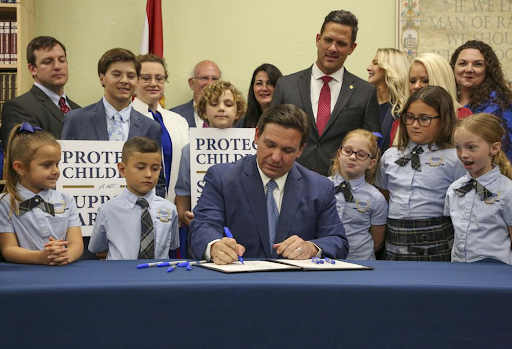“Don’t Say Gay” bill creates major controversy in a divided political landscape

Image via Douglas R. Clifford/Tampa Bay Times via AP
In March of 2022, Florida Governor Ron Desantis signed the “Parental Rights in Education” bill into action, popularly known as the “Don’t say gay” bill. The legislation sparked protests across the country and inspired multiple other states to pass similar laws in a nationwide trend of parental rights legislation.
According to the bill, the purpose of the legislation was to “reinforce the fundamental right of parents to make decisions regarding the upbringing and control of their children”. The bill prohibits classroom instruction surrounding LGBTQ+ issues from kindergarten to third grade, along with any material that is deemed inappropriate by the state.
While not as advertised, it gives a number of other rights to parents. To name just a few, schools are required to give a student’s health and educational records at a parent’s request, and parental permission would be required before a child could take health screenings in K-3. The bill also forces schools to tell parents if their children are receiving mental health services. If any of these rules are violated, the parents have the right to sue the school.
The bill created major pushback from the left, especially among the younger generation, who have dubbed the legislation the “Don’t Say Gay” bill. Democrats argued that by restricting LGBTQ+ discussions at school, it stigmatizes the topic and alienates LGBTQ+ students and teachers. Other democrats such as Andrew Spar, president of the Florida Education Association, argue that the bill is trying to address a problem that doesn’t exist. He highlighted that states already have curriculums that reflect what’s appropriate for classroom lessons, which usually excludes gender identity and sexual orientation in K-3 classrooms. “This bill is based on a falsehood, and that falsehood is that somehow we’re teaching kids inappropriate topics at an early age, and clearly we’re not”.
There has also been backlash about the specific language used in the bill. Democrats argue vague wording such as “age appropriate” suggests that the restrictions in the bill apply to grades beyond K-3, and doesn’t specify who determines what’s considered “age appropriate”. Democrats maintain that this could allow parents to sue schools over personal opinions rather than solid law, spreading restrictions on LBTQ+ discussion to more grades. Florida State Representative Carlos G. Smith said that “The bill’s intentionally vague language leaves teachers afraid to talk to their students and opens up school districts to costly and frivolous litigation from those seeking to exclude LGBTQ people from any grade level.”
Republicans have a very different perspective on the bill, claiming that the legislation has been demonized and mislabeled. Many right-wing supporters of the bill say that it doesn’t ban casual discussion of LGBTQ+ topics in schools and that outing students was never an objective in the legislation. “This common-sense bill is straightforward. No federal tax dollars should go to any federal, state, or local government agencies, or private organizations that intentionally expose children under 10 years of age to sexually explicit material,” says Louisiana Representative Mike Johnson. While part of the bill’s goal is to have tighter restrictions on what’s taught in younger classrooms, its main objective is to give more rights to parents in the educational system. In one case, a 13 year old child was put on a student support plan at school after raising the possibility of being non-bianary. However, the child’s mother, January Littlejohn, was never notified about the treatment. At the bill signing ceremony, Littlejon said “When parents are excluded from critical decisions…it sends the message to children that their parents’ input and authority are no longer important.”
The bill caused an uproar in the US shortly after it was announced, causing an eruption of protests across the country. Many democrats condemned the bill, including President Joe Biden. The Disney company also opposed the legislation in response to mounting pressure from its employees, causing the company to lose a tax benefit they’d enjoyed for 50 years in the state of Florida. Despite the fact that the bill faced multiple lawsuits, proposals for similar legislation quickly followed in Oklahoma, Tennessee, Kansas, and other states.
The fight over parental rights in schools continues across the country and will surely remain a hot topic for upcoming elections. While the long term effects of the legislation remain unknown, an increasingly divided political landscape in the United States clearly shows that neither side plans to back down on the issue.

Rhiannon Stevens is a Senior and the Sentinel's Social Media Editor. They love creating art, sewing clothes, and listening to true crime podcasts. She’s...















